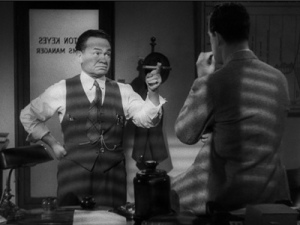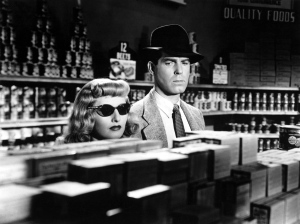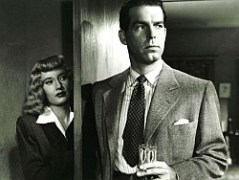“Who’d you think I was anyway? The guy that walks into a good-looking dame’s front parlor and says, “Good afternoon, I sell accident insurance on husbands… you got one that’s been around too long?
One you’d like to turn into a little hard cash?” – Walter Neff –
In Summary:
Double Indemnity is a film noir about an insurance man, Walter Neff (Fred MacMurray), who falls mistakenly in love with the beautiful Phyllis Dietrichson (Barbara Stanwyck) while trying to sell her insurance. The two conspire to remove Phyllis’ ill-tempered husband from the picture, so they can be together. In what is almost the perfect murder and insurance fraud scheme, director Billy Wilder places Barton Keyes (Edward G. Robinson) into the position of the voice of reason. The question is, will Keyes figure out what Walter and Phyllis have done before it’s too late.
Why I watched this one:
As it turns out, I’ve watched very few film noir pieces. I’m not sure why. I wanted and needed to watch more, and Double Indemnity has long been on my list. Also, I enjoy Fred MacMurray, and was interested to see his performance in this particular film.
So what is a noir? Variety describes the genre this way:
“Between the Great Depression and the start of the
Cold War, Hollywood went noir, reflecting the worldly, weary, wised-up under
current of mid-century America. In classics such as Laura, Sweet Smell of
Success, and Double Indemnity, where the shadows of L.A. and New York
pulse with killers, corpses, and perilous romance, failure is not only a logical option but a smart-talking seduction.” – Vanity Fair March 2007 –
Who isn’t drawn in by the idea that the shadows of L.A. and New York “pulse” with peril. It’s exciting. It’s dangerous. Honestly, though, if I wasn’t reading this quote as a description of film noir, I might mistake it for that of a mobster movie — Dick Tracy, The Godfather, The Sopranos, and The Departed immediately pop to mind. Filmnoir.net takes a different approach when describing the film noir.
“The great films noir had both popular appeal and artistic merit because their themes address the human condition and the frailty of normal lives, which at any moment can be plunged into the chasm of chaos,
through chance or individual action – innocent or otherwise.
How moral ambivalence, lust, love and greed can destroy lives was
explored outside the closed romantic realism of mainstream movies.”
I was always taught to believe they required this formula:
1. A femme fatale (always a femme fatale) — which means never trust the women in these films. Never.
2. Someone with some loose morals
3. A detective, or a crime
4. High contrast cinematography and lighting (big shadows, light vs. dark, black blacks and white whites — you get it)
Double Indemnity meets all of these film noir requirements, so no wonder it’s marked as one of the greats. It was nominated for seven Academy Awards in 1945, including Best Picture, but lost to the Bing Crosby film Going My Way.
My Review & Verdict — in Claps:
“Suddenly it came over me that everything would go wrong.
It sounds crazy, Keyes, but it’s true, so help me.
I couldn’t hear my own footsteps. It was the walk of a dead man.”
– Water Neff –
Every character with the exception of Barton Keyes was pretty much a scoundrel, a liar, a cheat, or a murderer. Of course, by “every character” I simply mean those played by MacMurray and Stanwyck. Perhaps, it was that bit of redemption at the end as Walter Neff comes clean about his crime that makes me like it. Perhaps, it was the intrigue throughout as I wondered how they’d commit their murder, and if dear Phyllis Dietrichson was really in love with Neff or simply playing him for a fool. Even though I know the woman is always deceptive in the noir, I always want to believe it isn’t true. I want a good guy. I want a happy ending. But then, Wilder began with the end and then had Walter tell the story from the beginning. I knew immediately there was no happy ending to be had, but I still enjoyed this film.
For the third time Billy Wilder has graced this blog, and he’s definitely becoming one of my favorites. Once more he’s created likeable unlikable characters who represent the good and bad in all of us. This time he did it in the acceptable form of film noir. Every director could learn a thing or two about character development and an interesting plot line from Mr. Wilder.
Thus it is, that you may clap in high contrast, with big scary shadow puppet hands, for Double Indemnity.
“Yes, I killed him. I killed him for money – and a woman –
and I didn’t get the money and I didn’t get the woman. Pretty, isn’t it?”
– Water Neff –
Related Articles:
- Essential Film Noirs ( fimnoir.net)
- Ebert’s Review of Double Indemnity (rogerebert.suntimes.com)
- Double Indemnity: An In Depth Look at the Classic (moderntimes.com)
- Film Noir Studies (filmnoirstudies.com)



